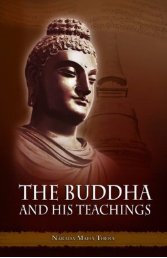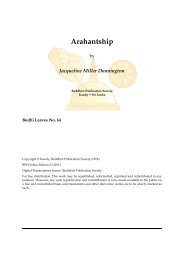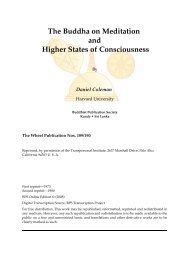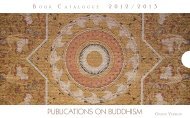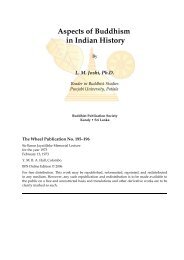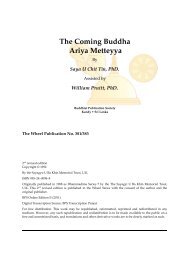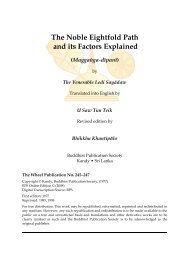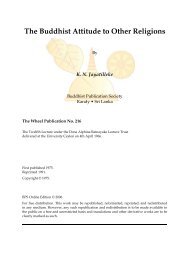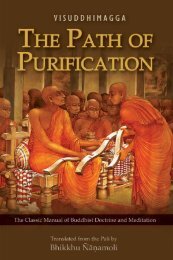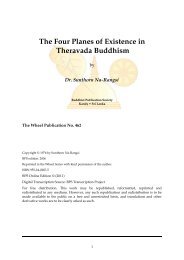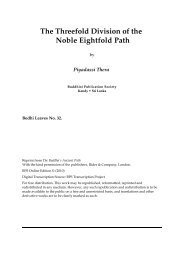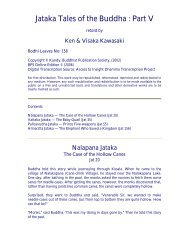Buddhism and Comparative Religion and Other Essays - Buddhist ...
Buddhism and Comparative Religion and Other Essays - Buddhist ...
Buddhism and Comparative Religion and Other Essays - Buddhist ...
Create successful ePaper yourself
Turn your PDF publications into a flip-book with our unique Google optimized e-Paper software.
high level which has earned for it the admiration of the world. Since the celebrated passage inthe Majjhima Nikāya 22 where Buddha argues controversially against the doctrine of theVedanta, <strong>and</strong> the Kathaka Upanishad 4, 14, where the Brahmins reject the <strong>Buddhist</strong> theories ofdharmas, the antagonism between the Vedanta <strong>and</strong> <strong>Buddhism</strong> permeates the whole history ofIndian philosophy, just as the fight between the conception of the world of Heraclitus <strong>and</strong>Parmenides dominates Greek philosophy. As so often in similar cases, each of the twoopponents has learned much from the other <strong>and</strong> taken over some of the other’s ideas. To mymind the monistic Mahāyāna shows the deep influence which Vedanta has exerted on later<strong>Buddhism</strong>. On the other h<strong>and</strong> the lofty idealism of Yogavasishta of Gaudapada <strong>and</strong> Shankaraare indebted to Nāgarjuna’s <strong>and</strong> Asaṅga’s theories on the unreality of the world.But the contribution of <strong>Buddhism</strong> to philosophical thought is not confined to India.<strong>Buddhism</strong> has been the originator <strong>and</strong> promoter of philosophy in many countries that had notyet developed a philosophy of their own when the doctrine of the Buddha reached them.<strong>Buddhism</strong> has stimulated the intelligentsia in Ceylon, Burma, Siam, Kamboja, Laos, Korea,Japan, Tibet <strong>and</strong> Mongolia, to philosophical endeavours. In China, too, which already possesseda philosophy of a high level, <strong>Buddhism</strong> has greatly developed the indigenous metaphysicalthought. It is well known that Taoism, at least in its later phases, has been influenced by<strong>Buddhist</strong> theories. But Confucianism too is indebted to it. It seems to me that the founder of theNeo-Confucian school, the celebrated Chu Hsi (1130–1200), though a staunch opponent of<strong>Buddhism</strong>, has learned much from <strong>Buddhism</strong>. Idealists such as Shao Yung (1011–1077) <strong>and</strong>Wans Yangmin (1472–1528) too have drawn deeply from the fountain of Mahāyāna.<strong>Buddhism</strong> having had such an enormous direct <strong>and</strong> indirect influence on philosophicalthought in the whole of Southern <strong>and</strong> Eastern Asia proves that it must have appealed greatly toAsian mentality.It is noteworthy, that in contradistinction to the overwhelming importance <strong>Buddhism</strong> has hadin the East, it has till now not been able to fertilize, in a comparable way, thought in the West.The reason for this fact may have been that its sublime doctrines were not easy for Westerners tounderst<strong>and</strong>, though the emperor Ashoka had already sent missions to the Greek kings.As far as our present knowledge goes it was only gradually that <strong>Buddhism</strong> unveiled itsessence to the Occident. The Greeks already knew of the name, Buddha. They also knew of hissupernatural birth <strong>and</strong> they were aware of the fact that the Samanaioi (śrāmaṇa) were differentfrom the brahmanical ascetics. In the Middle Ages the story of Buddha leaving his home wasknown in the Christianized form of the legend of Barlām <strong>and</strong> Josaphat. Marco Polo (1254–1323),the famous Italian traveller, paid his tributes to the saintly life of Gautama when he wrote in hisTravel Diary: “lllec fist moult grans adbstinences, ainsi comme s’il eust este crestien. Car s’il I’eust este,il feust un gr<strong>and</strong> saint avec notre Seigneur Jhesucrist, a la bonne vie et honneste qu’il mena.” “He liveda life of gr<strong>and</strong> abstinence as if he had been a Christian. For had he been, he would have been agreat saint with our Lord Jesus Christ, considering the good <strong>and</strong> honest life he led.” The firstEuropean I know of who mentions an important doctrine of <strong>Buddhism</strong>, which distinguishes itfrom the other great religions of the world was the French traveller, La Loubere, who wrote inhis work Du Royaume de Siam, published in 1691, (Vol. 1, p. 395), “I think that one can establishthat <strong>Buddhist</strong>s do not believe in a world-ruling deity.” We are indebted to the great Englishindologist, Henry Thomas Colebrooke 7 for the first interpretation of the <strong>Buddhist</strong> theory thatthere is no transmigrating soul but nevertheless a rebirth caused by karmic influence. In thelecture “On Indian Sectaries,” read at a public meeting of the Royal Asiatic Society, February 3,1827, he said, “There is not an eternal soul, but merely succession of thought, attended by7H. Th. Colebrooke, <strong>Essays</strong> on the Philosophy of the Hindu (1829). New edition of his works by E. B. Cowell,London 1873, Vol. 11, p. 419.9



